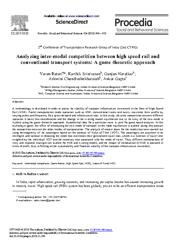A copy of this work was available on the public web and has been preserved in the Wayback Machine. The capture dates from 2017; you can also visit the original URL.
The file type is application/pdf.
Analyzing Inter-modal Competition between High Speed Rail and Conventional Transport Systems: A Game Theoretic Approach
2013
Procedia - Social and Behavioral Sciences
A methodology is developed in order to assess the viability of transport infrastructure investment in the form of High Speed Rail (HSR). Public transportation mode operators such as HSR, conventional trains and buses, maximize their profits by varying prices and frequency for a given demand and infrastructure cost. In this study, the price competition between different operators is taken into consideration and the change in the existing market equilibrium due to the entry of the new mode is
doi:10.1016/j.sbspro.2013.11.185
fatcat:koi4xordvjdtjig54i4eo3agx4

